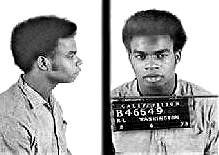Who Killed Raymond Washington? The Unsolved Mystery Behind The Crips' Founder
Introduction
Raymond Lee Washington, born on August 14, 1953, in Los Angeles, California, is best known as the founder of the Crips, one of the most notorious street gangs in the United States. Despite his pivotal role in shaping the gang culture in Los Angeles, Washington's life ended tragically at the age of 25 when he was gunned down in South Central Los Angeles on August 9, 1979. The murder remains unsolved, leaving behind a legacy of questions about his death and the circumstances surrounding it. This article delves into the life of Raymond Washington, his contributions to the formation of the Crips, and the ongoing mystery of who killed him.
The Life of Raymond Washington
Raymond Washington was the youngest of four sons born to Violet Samuel and Reginald Cecil Washington. His parents separated when he was just two years old, and he was raised by his mother and stepfather in South Central Los Angeles. Growing up on East 76th Street, Washington lived in a tough neighborhood where he quickly earned a reputation for being tough and fearless.
At the age of 16, Raymond Washington became the OG of OGs by founding the Crips, a street gang that would later become one of the largest and most infamous in the world. Initially, the Crips were formed as a protective group against rival gangs, but over time, their activities evolved into more violent and criminal endeavors.
The Founding of the Crips
Early Beginnings
Washington co-founded the Crips in 1971 with Stanley "Tookie" Williams. The gang initially started as a minor street organization aimed at protecting its members from other gangs in South Los Angeles. However, the Crips quickly grew in size and influence, spreading across various districts and becoming a dominant force in gang culture.
Growth and Expansion
- By the early 1970s, the Crips had established themselves as a major street gang in Los Angeles.
- The gang's influence expanded beyond South Central, reaching other cities and states.
- Washington's leadership played a crucial role in shaping the Crips' identity and operations.
Despite his involvement in founding the Crips, Washington distanced himself from the gang after his release from prison in 1979. He served time from 1974 to 1979, during which he reflected on his life and the path he had chosen. Upon returning to the streets, Washington no longer held the same level of influence within the gang.
The Murder of Raymond Washington
Details of the Killing
On August 9, 1979, Raymond Washington was shot and mortally wounded at the corner of San Pedro Street and East 64th Street in Los Angeles. The location where Washington was killed is infamous in gang history, marking the end of the founder's life. Despite numerous investigations, the murder remains unsolved, leaving many questions unanswered about the identity of his killer and the motives behind the crime.
Speculations and Theories
Over the years, various theories have emerged regarding Washington's death. Some speculate that a rival gang member, possibly from the Bloods, was responsible for the killing. Others suggest internal conflicts within the Crips may have led to his assassination. Below are some of the most prevalent theories:
- Bloods Involvement: Some believe that a Blood girl or member of the rival gang was responsible for Washington's death.
- Internal Conflict: It is also rumored that a West Side Crip may have killed Washington to allow Stanley Williams to take over the gang.
- Personal Vendetta: Another theory suggests that Washington's murder could have been motivated by a personal dispute rather than gang-related reasons.
While these theories remain speculative, they highlight the complexities and rivalries within the gang world that Washington helped create.
Legacy and Impact
Despite his early death, Raymond Washington's legacy continues to influence gang culture and history. As the founder of the Crips, his actions shaped the landscape of street gangs in Los Angeles and beyond. Although he distanced himself from the gang in his later years, his name remains synonymous with the Crips and their impact on society.
Washington's life and death serve as a cautionary tale about the dangers of gang involvement and the cycle of violence that often ensues. His story is a reminder of the lasting effects of choices made in youth and the challenges faced by those seeking to break free from such lifestyles.
Conclusion
The murder of Raymond Washington remains one of the most intriguing and unresolved cases in gang history. Born in South Central Los Angeles, Washington rose to prominence as the founder of the Crips, a street gang that would become infamous for its violence and influence. Despite distancing himself from the gang after his release from prison, Washington's life ended tragically at the age of 25. Theories abound regarding the identity of his killer, but the case remains unsolved to this day.
Washington's legacy is complex, marked by both the creation of a powerful street organization and the subsequent violence it engendered. His story serves as a reminder of the far-reaching consequences of gang culture and the challenges faced by those who seek to change their lives. While the mystery of who killed Raymond Washington may never be fully resolved, his impact on gang history and society continues to resonate.

Raymond Washington (top center) surrounded by the locs. Notice the

Explorations Interculturelles - Culture : Bloods vs Crips

REALYZE WURD: Gangsta King: Raymond Lee Washington-